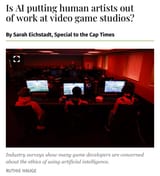>Verona resident Katie DeJarlais dreams of working as an artist for a film company or a video game developer, creating animated characters and environments for people to enjoy.
>But after earning a graduate degree in video game development and building up a work portfolio, DeJarlais feels close to giving up on that dream. A year of job hunting has left her frustrated by the industry’s adoption of artificial intelligence.
>“(The jobs) either barely exist or they're telling you that they want you to use the AI tools in your work,” DeJarlais said. “Creating art is something that makes a lot of people very happy, and it's an outlet for creative expression. As we're cheapening it into something you can make instantly, it's going to discourage people from making art.”
>DeJarlais graduated in June 2024 from Savannah College of Art and Design in Georgia, where the sticker price for annual tuition is over $40,000. She moved to Verona after graduation to live with family.
>“It's like, why am I even bothering at this point if they could just ask a robot to do it five times faster than I ever could?” she said.
>A Wire magazine investigation found the growth of AI last year had contributed to widespread layoffs in the industry, including at major studios like Microsoft-owned Activision Blizzard — the parent company of Raven Software in Middleton.
>An industry survey last year by the Game Developers Conference found 11% of developers reported getting laid off that year. Narrative-related positions — including writers, designers and artists — made up the largest segment of laid off workers.
>While AI isn’t completely cutting artists from the video game industry, it seems to be replacing the first few steps of an artist’s process. Jobs are shifting toward editing AI artwork rather than designing from scratch.
New artist graduates for game design having high difficulty getting work due to AI
